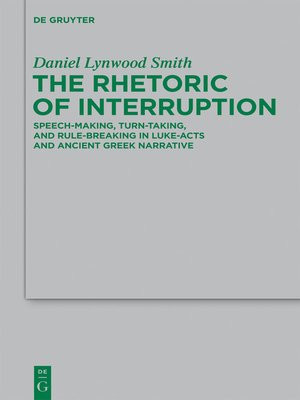The Rhetoric of Interruption
ebook ∣ Speech-Making, Turn-Taking, and Rule-Breaking in Luke-Acts and Ancient Greek Narrative · Beihefte zur Zeitschrift für die neutestamentliche Wissenschaft
By Daniel Lynwood Smith

Sign up to save your library
With an OverDrive account, you can save your favorite libraries for at-a-glance information about availability. Find out more about OverDrive accounts.
Find this title in Libby, the library reading app by OverDrive.



Search for a digital library with this title
Title found at these libraries:
| Library Name | Distance |
|---|---|
| Loading... |
Why are so many speakers interrupted in Luke and in Acts? For nearly a century, scholars have noted the presence of interrupted speech in the Acts of the Apostles, but explanations of its function have been limited and often contradictory. A more effective approach involves grounding the analysis of Luke-Acts within a larger understanding of how interruption functions in a wide variety of literary settings. An extensive survey of ancient Greek narratives (epics, histories, and novels) reveals the forms, frequency, and functions of interruption in Greek authors who lived and wrote between the eighth-century B.C.E. and the second-century C.E.
This comparative study suggests that the frequent interruptions of Jesus and his followers in Luke 4:28; Acts 4:1; 7:54–57; 13:48; etc., are designed both to highlight the pivotal closing words of the discourses and to draw attention to the ways in which the early Christian gospel was received. In the end, the interrupted discourses are best understood not as historical accidents, but as rhetorical exclamation points intended to highlight key elements of the early Christian message and their varied reception by Jews and Gentiles.







